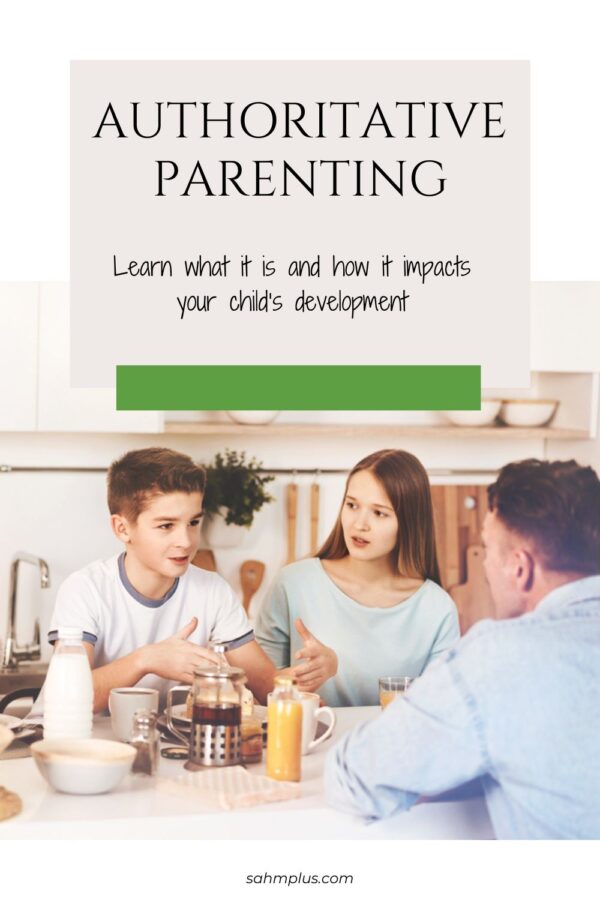Ever heard of authoritative parenting? It’s a balanced parenting style that’s all about setting clear rules but also being super responsive and supportive. Unlike those strict or overly laid-back approaches, it’s all about creating a space where kids can grow and figure things out on their own. By mixing this rule-setting with open chats and understanding, it’s meant to help kids be independent, responsible, and good at getting along with others.
So, in this article, we’re diving deep into how authoritative parenting can totally shape your kid’s world. We’ll explore how it boosts their self-esteem and smarts, and even how it helps them learn to take on responsibilities. Plus, we’ll uncover some practical tips on how you can strike that perfect balance between being their rock and letting them spread their wings. Get ready to discover how this parenting style can make a real difference in your child’s life!

What is Authoritative Parenting?
Authoritative parenting is a well-known and widely studied parenting style that emphasizes a balanced approach to raising children. It is characterized by parents who set clear expectations and boundaries for their children while being responsive, nurturing, and supportive.
Unlike other parenting styles that lean towards strict control or permissiveness, authoritative parents strive to create an environment where children can thrive and develop into independent individuals. They establish rules and guidelines but encourage open communication, mutual respect, and understanding.
This parenting style promotes healthy child development by fostering autonomy, self-discipline, and social competence. Authoritative parents provide guidance and structure without being overly controlling or harsh. They value their child’s opinions and emotions while still maintaining parental authority.
Through this approach, authoritative parents create a nurturing environment that allows children to explore their interests, make decisions within reasonable limits, and learn from both successes and failures. This balance between setting expectations and being responsive helps children develop important life skills such as problem-solving, self-confidence, empathy, and resilience.
Examples of Authoritative Parenting
Authoritative parenting is often regarded as one of the most effective and beneficial approaches. This parenting style emphasizes a balance between setting clear rules and expectations while providing warmth, support, and open communication with children.
Examples of authoritative parenting can be seen in various aspects of a child’s life. For instance, parents who adopt an authoritative approach tend to
- Establish consistent rules and boundaries for children.
- Set clear expectations regarding behavior, chores, and academic performance.
- Take the time to explain the reasoning behind rule to their children.
- Encourage children to express their thoughts and opinions, fostering open communication within the family.
Imagine this: little Emma is trying to understand why she can’t have a second piece of cake before dinner. Instead of a simple “no,” her mom, practicing authoritative parenting, takes the time to explain the importance of balanced nutrition and the joy of savoring treats in moderation. Emma, though a bit disappointed, starts to understand the reasoning behind her mom’s decision.
Now picture young Alex, who forgot to complete his homework for the third time this week. Instead of facing harsh punishment, his dad, an authoritative parent, sits down with him, discussing the importance of responsibility and time management. Alex learns that his actions have consequences, but he also feels supported in finding better strategies to stay organized.
Contrast these with Sarah, who feels restricted and misunderstood because her parents never allow her to voice her opinions or make decisions independently. Sarah’s struggle to express herself often leads to pent-up frustration and a lack of self-confidence. Without the chance to understand the reasoning behind rules, she finds it difficult to grasp the importance of discipline in a nurturing environment.
Similarly, picture John, whose parents give in to his every demand without teaching him the value of patience or hard work. While he enjoys the immediate satisfaction, John gradually struggles with managing expectations and facing challenges independently. Without clear boundaries, he finds it challenging to understand limits, leading to difficulties in navigating social situations.
In these examples, it’s clear how authoritative parenting fosters understanding, responsibility, and resilience in children, setting them on a path towards holistic growth and development.
Authoritative Parenting Pros and Cons
One of the key advantages of authoritative parenting is that it promotes healthy development in children.
Authoritative Parenting Advantages:
- Promotes healthy development in children by providing structure and guidance.
- Helps children develop self-discipline, responsibility, and independence.
- Fosters open communication and encourages children to express their thoughts and feelings.
- Creates a positive parent-child relationship based on mutual respect.
- Builds trust between parent and child, leading to a stronger bond and better overall emotional well-being.
Authoritative Parenting Disadvantages:
- Requires a significant amount of time and effort from parents.
- Setting consistent boundaries and explaining rules can be demanding on parents’ energy levels.
- May not work for every child or family dynamic, as some children may require more structure or flexibility depending on their individual needs or temperament.
Parents need to be adaptable in their approach while still maintaining the core principles of authoritative parenting.
The Characteristics and Benefits of Authoritative Parenting
Clear Expectations and Rules:
In any household, clear expectations and rules is crucial in shaping children’s behavior and development. Authoritative parents understand the importance of setting boundaries and establishing guidelines for their children. By doing so, they create a structured environment that promotes positive growth and responsible decision-making.
Parental expectations serve as a guiding light for children, helping them understand what is expected of them in terms of behavior, responsibilities, and achievement. These expectations can cover various aspects of life, such as academics, chores, social interactions, and personal values. By clearly communicating these expectations to their children, authoritative parents provide a framework for success while instilling important life skills.
Household rules are another essential component of creating a harmonious family environment. These rules set the boundaries within which children can operate and help them develop self-discipline and respect for others. Authoritative parents establish rules that are fair and reasonable while taking into account the developmental stage of each child.
By setting clear expectations and enforcing household rules consistently, authoritative parents create an atmosphere where children feel secure and supported. This approach encourages open communication between parents and children, fostering mutual understanding and trust. It also allows children to develop autonomy within defined boundaries while learning the importance of responsibility.
Warmth and Support:
Creating a nurturing environment for children is crucial in their emotional development. Warmth and support from authoritative parents play a vital role in building trust and connection with their children.
When parents provide emotional support, they create an atmosphere where children feel safe to express themselves and share their thoughts and feelings. This helps foster a strong parent-child relationship based on trust, empathy, and understanding.
By offering warmth and support, parents can help their children develop resilience, self-esteem, and emotional intelligence. When children feel emotionally supported, they are more likely to navigate challenges with confidence and develop healthy coping mechanisms.
Authoritative parents who combine warmth and support with clear boundaries create an optimal environment for their children’s growth. This parenting style encourages open communication while providing structure and guidance.
Open Communication:
Open communication is a vital aspect of effective parenting, particularly when it comes to fostering healthy relationships with our children. Practicing active listening and encouraging dialogue can create an environment where their children feel comfortable expressing themselves and sharing their thoughts and feelings.
One key component of open communication is developing active listening skills. This involves giving our children our full attention when they are speaking, maintaining eye contact, and showing genuine interest in what they have to say. By doing so, we validate their experiences and demonstrate that we value their perspectives.
Encouraging dialogue is another essential aspect of open communication. Rather than simply dictating rules or decisions, authoritative parents create opportunities for discussion and negotiation. This approach allows children to express their opinions, ask questions, and contribute to the decision-making process within appropriate boundaries set by the parents.
Open communication from authoritative parenting provides numerous benefits for both parents and children. It helps build trust and mutual respect between family members, strengthens emotional bonds, and promotes the development of effective problem-solving skills in children.
By fostering open communication within the parent-child relationship, we empower our children to become confident communicators who can express themselves effectively in various contexts throughout their lives.
Reasoning and Consistency:
When it comes to parenting, reasoning and consistency play a crucial role in shaping a child’s behavior and understanding of consequences. Explaining the consequences of actions to children helps them develop a sense of responsibility and empathy, while consistent enforcement of rules establishes clear boundaries and expectations.
Authoritative parenting, which combines warmth with reasonable discipline, emphasizes the importance of reasoning with children. By explaining why certain behaviors are acceptable or not, parents can help their children understand the underlying values and principles behind the rules. This approach encourages critical thinking and problem-solving skills, as children learn to consider the impact of their actions on themselves and others.
Consistency in enforcing rules is equally important for effective parenting. When parents consistently follow through with consequences for certain behaviors, children learn that there are predictable outcomes for their actions. This consistency helps establish trust between parent and child, as well as a sense of security in knowing what is expected of them.
Reasoning and consistency work hand in hand to create a nurturing environment where children can learn from their mistakes, understand cause-and-effect relationships, and develop self-discipline. By employing authoritative parenting techniques that emphasize both reasoning and consistency, parents can guide their children towards becoming responsible individuals who make thoughtful choices based on understanding the consequences of their actions.
Effects of Authoritative Parenting
Authoritative parenting has a profound impact on the socio-emotional and cognitive development of children. This parenting style tends to have a positive impact on various aspects of a child’s growth.
Authoritative Parents
- Foster self-esteem and confidence in children by providing consistent support and encouragement.
- Help children develop a strong sense of self-worth and belief in their abilities.
- Promote cognitive development through setting high expectations and encouraging critical thinking, problem-solving and decision-making.
- Cultivate a sense of responsibility in kids by establishing clear rules and expectations, fostering accountability for their behavior.
- Nurture independence by encouraging age-appropriate decision-making and providing guidance when needed, helping children develop essential life skills.
This approach allows children to develop essential life skills such as decision-making, time management, and problem-solving abilities from an early age.
Distinguishing Authoritative Parenting from Other Parenting Styles
Understanding the different parenting styles is crucial in shaping a child’s development and overall well-being. One such style, authoritative parenting, stands out as a balanced approach that promotes healthy growth and independence. It is important to distinguish authoritative parenting from other styles, such as permissive parenting, to fully grasp its benefits and impact on children.
While permissive parents may be characterized by their leniency and lack of structure, authoritative parents strike a delicate balance between setting boundaries and fostering independence. They provide clear guidelines for behavior while still allowing their children to explore and make decisions within those boundaries.
Unlike permissive parents who may avoid discipline or have inconsistent rules, authoritative parents understand the importance of discipline as a means of teaching responsibility. They establish fair consequences for actions while also taking the time to explain the reasoning behind those consequences.
Furthermore, authoritative parents prioritize open communication with their children. They actively listen to their thoughts and feelings, providing guidance and support when needed. This approach helps foster a strong parent-child relationship built on trust and mutual respect.
In contrast, permissive parents may struggle with establishing effective communication channels with their children due to the lack of structure in their parenting style. This can lead to misunderstandings or difficulties in addressing important issues that arise during childhood and adolescence.
By distinguishing authoritative parenting from other styles like permissive parenting, we can better understand its positive impact on child development. Authoritative parents provide a nurturing environment that promotes self-confidence, emotional intelligence, and responsible decision-making skills in their children.
Embracing Authoritative Parenting for Raising Well-rounded and Confident Children
Embracing authoritative parenting can have a profound impact on raising well-rounded and confident children. Adopting a positive and nurturing approach can create an environment that fosters growth, resilience, and emotional well-being.
Building strong parent-child relationships is at the core of authoritative parenting. This involves open communication, active listening, and mutual respect. When children feel supported and understood by their parents, they are more likely to develop a sense of security and self-confidence.
Authoritative parenting also emphasizes setting clear boundaries and expectations while allowing room for independence and autonomy. By providing guidance rather than control, parents can empower their children to make responsible decisions and develop critical thinking skills.
Furthermore, this parenting style encourages the development of important life skills such as problem-solving, empathy, and self-discipline. By teaching children how to navigate challenges effectively, they are better equipped to face adversity in the future.
In a world that is constantly evolving, it is crucial for parents to adapt their approach to meet the needs of their children. Embracing authoritative parenting helps raise well-rounded individuals and meaningfully strengthens the parent-child bond. By nurturing our children with love, support, and guidance, we set them on a path towards success and fulfillment in all aspects of life.
FAQs About Authoritative Parenting
Why is authoritative parenting better?
Authoritative parenting is considered advantageous because it fosters a healthy balance between structure and nurturing. This style promotes independence, self-discipline, and social competence in children while also maintaining a positive parent-child relationship based on mutual respect and understanding.
Is authoritative parenting the same as gentle parenting?
While there are some similarities, authoritative parenting and gentle parenting are not exactly the same. Gentle parenting often focuses on avoiding punishment and using a non-punitive approach to discipline, whereas authoritative parenting emphasizes setting clear boundaries and expectations while maintaining warmth and open communication.
What is another word for authoritative parenting?
Another term often used to describe authoritative parenting is ‘balanced parenting’. This term highlights the balance between setting rules and expectations and providing emotional support and understanding for children.
Are authoritative parents strict?
Authoritative parents are not typically characterized as strictly authoritarian. While they do set clear rules and expectations, they also prioritize open communication and understanding. This approach helps children develop a sense of autonomy and responsibility within a nurturing and supportive environment.
Articles In Our Parenting Styles Series
- 4 Parenting Styles & What They Mean for Your Family
- Why Are Parenting Styles Important?
- How to Agree on Parenting Styles When Your Differences Hurt Your Marriage
- The More Children You Have, The More Your Parenting Style Changes
- Top Tips to Help You Change Your Parenting Style

